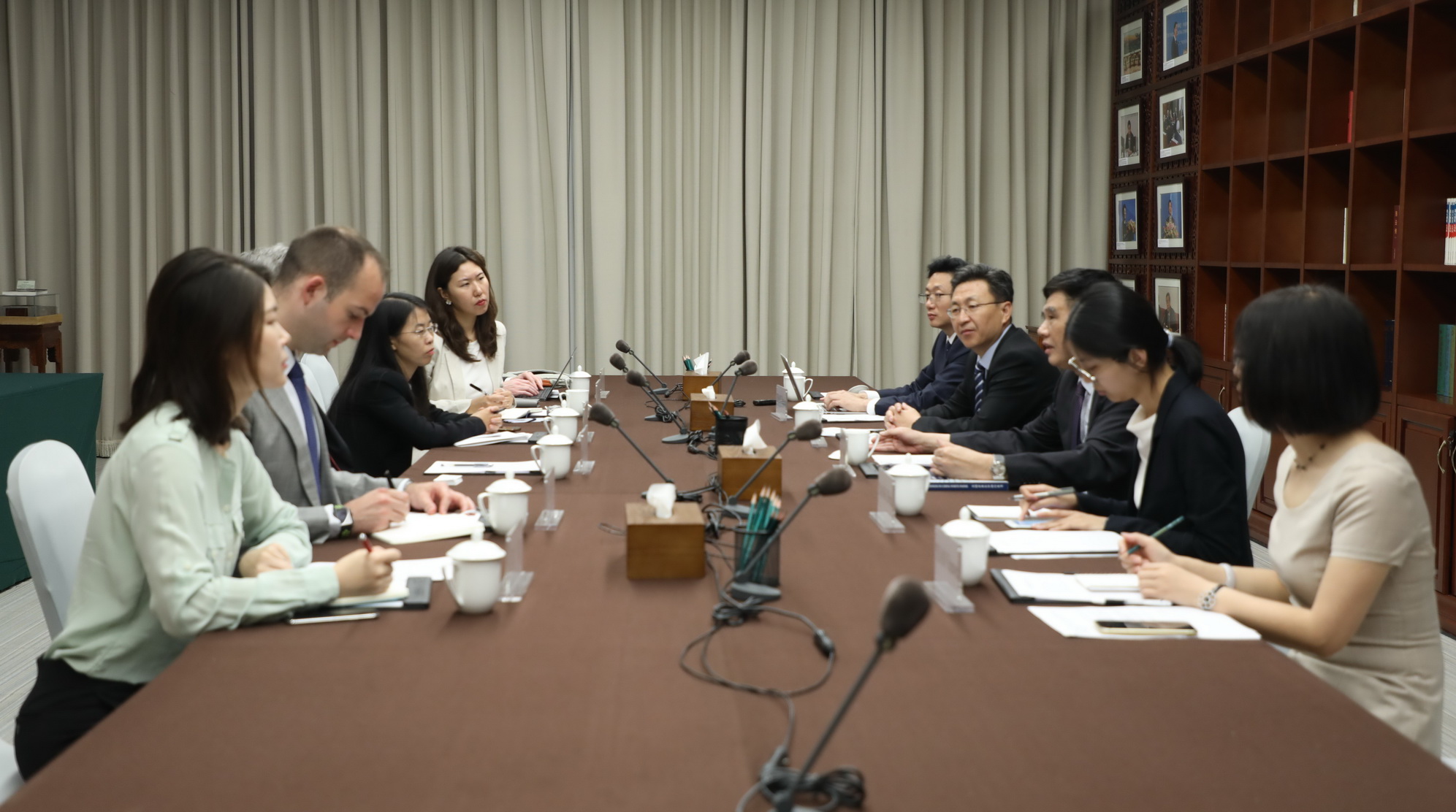CCIEE Executive Vice Chairman Zhang Xiaoqiang Meets with Craig Allen, President of the US-China Business Council
- Time:2019-06-25
- source:CCIEE
On June 19, 2019, Zhang Xiaoqiang, Executive Vice Chairman of CCIEE and Director of the Executive Board, met with Craig Allen, President of the US-China Business Council (USCBC), and conducted in-depth exchanges on issues related to the China-US economic and trade relations. Xu Chaoyou, Director-General of the Department of External Affair, Zhang Huanbo, head of the US-European Institute, and Jacob Parker, Senior Vice President of USCBC, attended the meeting.

Zhang Xiaoqiang said that the whole world expects China and the United States to reach a viable agreement but what the US did during the China-US trade negotiations violated the common interests of China and the United States. During the phone call with President Trump yesterday, President Xi Jinping said that China and the United States should promote a coordinated, cooperative and stable bilateral relationship on the basis of mutual respect and benefit. Vice Premier Liu He elaborated the three principles of China. In the economic and trade negotiations, the US has put forward a number of demands, such as requiring China to expand its market opening up and fair treatment of the US investment in China. Indeed, China has made remarkable progress in its opening up and more foreign investment has entered the Chinese market in recent years. Actually, many American companies have benefited a lot from the Chinese market. According to a report issued by Rhodium Group, the investment of Chinese companies in the United States has dropped from about $45 billion in 2016 to $30 billion in 2017 and then to $5 billion in 2018. This is not because Chinese companies are reluctant to invest in the United States, but the US has implemented protectionism. In the name of “national security”, the US discriminates against Chinese companies’ investment in the United States and does not allow fair competition. The US should correct its wrong practices and make practical changes.
Since the ZTE incident, the United States has increased restrictions on technical cooperation between Chinese and American companies, and made a false charge against Huawei, accusing it of stealing US technology. Some senior US government officials even said that the United States will not pay royalties to any Chinese company. Zhang Xiaoqiang emphasized that the Chinese government will continue to promote reform and opening up, further shorten the negative list, and implement the Foreign Investment Law. The Chinese government is also reforming its administration. President Xi Jinping and Premier Li Keqiang have repeatedly emphasized to streamline administration and delegate power to the lower levels; innovate supervision, provide efficient services, and allow the market to play a leading role. In recent years, the improvement in China’s business environment has been recognized by the World Bank. The Chinese government is steadily advancing intellectual property protection and will not force foreign companies to transfer technology. Speaking of the international governance system, he pointed out that the Chinese government advocates a fair competition market and treats all enterprises equally in the building of the belt and road. The reform of the WTO should focus on emerging markets and developing countries, embrace the multilateral system, and incorporate new formats including e-commerce. For CPTPP, CCIEE has conducted in-depth research and made relevant recommendations to the government.
Mr. Allen said that the USCSC explicitly opposed the tariffs used by the US government to solve the China-US trade frictions. The council supports Chinese companies to invest in the United States, just like China welcomes US investment. The investment made by Chinese companies in the United States has created a lot of jobs for the United States. Due to the reduction in investment, American workers are having a very difficult time. The United States is very pleased to see the introduction of the Foreign Investment Law of China. At the same time, the China-US trade negotiations have also improved the business environment in China. He hopes that the Chinese government can show the world that it will continue to resolutely fulfill its WTO obligations and lead the reform of the WTO to make the reform more inclusive. This will also help US companies to urge the US government to support and comply with the WTO rules. Mr. Allen expressed that USCBC will continue to introduce and explain China’s laws, regulations and reform and opening up policies in the economic and trade field to American society, government and enterprises.
At the end of the meeting, the two sides stated that they will continue to strengthen cooperation and jointly promote the better development of the China-US economic and trade relations.
